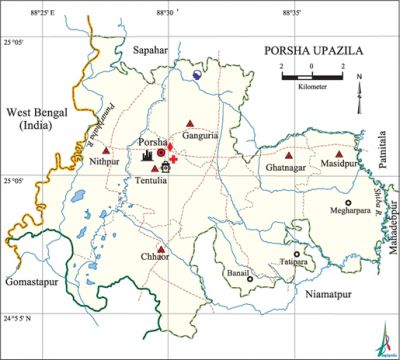Porsha Upazila
Porsha Upazila (naogaon district) area 252.83 sq km, located in between 24°54' and 25°05' north latitudes and in between 88°24' and 88°39' east longitudes. It is bounded by sapahar upazila on the north, gomastapur and niamatpur upazilas on the south, patnitala and mahadebpur upazilas on the east, west bengal state of India on the west.
Population Total 121809; male 61896, female 59913; Muslim 104571, Hindu 8055, Buddhist 1397, Christian 32 and others 7754. Indigenous communities such as santal, oraon and Pahan belong to this upazila.
Water bodies Main rivers: punarbhaba, Shiba.
Administration Porsha Thana was formed in 1933 and it was turned into an upazila in 1984.
| Upazila | ||||||||
| Municipality | Union | Mouza | Village | Population | Density (per sq km) | Literacy rate (%) | ||
| Urban | Rural | Urban | Rural | |||||
|
- |
6 |
155 |
253 |
10704 |
111105 |
482 |
40.8 |
35.1 |
| Upazila Town | ||||||||
|
Area (sq km) |
Mouza |
Population |
Density (per sq km) |
Literacy rate (%) | ||||
|
4.91 |
4 |
10704 |
103 |
40.79 | ||||
| Union | ||||
| Name of union and GO code | Area (acre) | Population | Literacy rate (%) | |
| Male | Female | |||
|
Ganguria 23 |
8744 |
7923 |
7664 |
42.14 |
|
Ghatnagar 31 |
8765 |
10368 |
10003 |
39.22 |
|
Chhaor 15 |
11790 |
8778 |
8600 |
30.59 |
|
Tentulia 87 |
9150 |
10155 |
9862 |
34.16 |
|
Nithpur 55 |
14591 |
15026 |
14441 |
29.87 |
|
Masidpur 47 |
9436 |
9646 |
9343 |
40.56 |
Source Bangladesh Population Census 2001, Bangladesh Bureau of Statistics.

Archaeological heritage and relics Shahi Mosque, Bala Shaheed Mazar (Nithpur), Berachoki Pond (Tentulia).
History of the War of Liberation During the war of liberation in 1971, the Pak army in collaboration with the local razakars conducted mass killing in different places such as beside the Baro Idara (large well) at Nithpur, under the bridge of Baliachanda, eastern side of Shisha Bazar and on the southern side of Ganguria College.
Marks of the War of Liberation Mass grave 4.
Religious institutions Mosque 268, temple 41, church 1.
Literacy rate and educational institutions Average literacy 35.6%; male 38.5%, female 32.6%. Educational institutions: college 2, primary school 111, madrasa 2. Noted educational institutions: Porsha Degree College (1969), Ganguria Technical and Agricultural Degree College (1987), Porsha High School (1927), Nithpur High School (1936), Porsha High Madrasa Cum High School (1927), Palashbari Chachaibari Fazil Madrasa (1964).
Cultural organisations Library 20, club 89, cinema hall 1.
Main sources of income Agriculture 81.44%, non-agricultural labourer 3.16%, industry 0.22%, commerce 5.43%, transport and communication 0.93%, service 3.34%, construction 0.25%, religious service 0.13%, rent and remittance 0.03% and others 5.06%.
Ownership of agricultural land Landowner 50.20%, landless 49.80%; agricultural landowner: urban 41.14% and rural 50.95%.
Main crops Paddy, wheat, mustard.
Extinct or nearly extinct crops Local varieties of paddy.
Main fruits Mango, jackfruit, litchi, water melon.
Fisheries, dairies and poultries Fishery 2, dairy 1, poultry 11.
Communication facilities Pucca road 27 km, semi-pucca road 19 km, mud road 229 km.
Extinct or nearly extinct traditional transport Palanquin, horse carriage.
Noted manufactories Rice mill 11, ice factory 3, flour mill 2, welding factory 16.
Cottage industries Goldsmith 27, blacksmith 112, potteries 243, embroidery 210, bamboo work 215, wood work 256.
Hats, bazars and fairs Hats and bazars are 12, fairs 2, most noted of which are Ganguria Hat, Masidpur Hat, Shisha Hat and Korbola Mela.
Main exports Paddy, wheat, bamboo work.
Access to electricity All the unions of the upazila are under rural electrification net-work. However 27.01% of the dwelling households have access to electricity.
Sources of drinking water Tube-well 93.91%, tap 0.30%, pond 0.20% and others 5.59%.
Sanitation 17.89% (rural 17.29% and urban 34.42%) of dwelling households of the upazila use sanitary latrines and 50.76% (rural 51.37% and urban 33.77%) of dwelling households use non-sanitary latrines; 31.35% of households do not have latrine facilities.
Health centres Upazila health complex 1, health and family welfare centre 3, satellite clinic 2, clinic 5.
NGO activities Operationally important NGOs are caritas, brac, CARE, proshika, asa. [Md. Mukhlesur Rahman]
References Bangladesh Population Census 2001, Bangladesh Bureau of Statistics; Cultural survey report of Porsha Upazila 2007.
